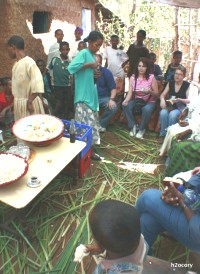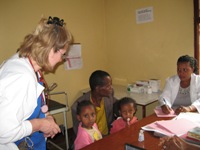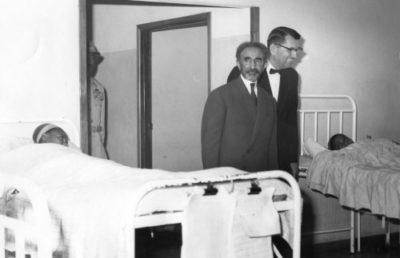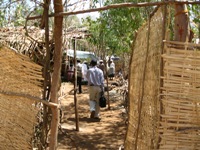From the mountains of Ethiopia to the Kansas plains and back again
In 2009, the UMKC School of Nursing launched the Rural Nurse Initiative — a program designed to provide distance education opportunities to nurses working in rural areas. When looking for someone to serve as director of the program, Lora Lacey-Haun, dean of the nursing school, wanted a nurse with experience working in rural health care settings. She immediately thought of JoAnn Klaassen, a clinical assistant professor at the school.
As a teenager, Klaassen’s family lived in a rural area outside of McPherson, Kan., where she went to high school and college, eventually receiving her nursing degree from Wichita State University. Before her family moved to central Kansas, however, Klaassen’s rural connection began in a much different setting. Klaassen’s parents were missionaries, and she was born and spent the first fourteen years of her life in rural Ethiopia.
“Most of my childhood was spent at very remote villages in the mountains close to the Ethiopia-Kenya border or at the leprosarium in the Rift Valley desert where my father was administrator,” Klaassen said. “Most of the places where we lived and traveled were virtually inaccessible except by 4-wheel drive during the dry season.”
In some of the more remote villages they visited, Klaassen said, not only were they the first white people many of the villagers had ever seen, they were the first “outsiders” of any kind to visit them. At the time – the late 1950s to the late 1960s – cases of smallpox and malaria were common in the rural regions of Ethiopia. Klaassen’s parents worked with other missionaries and outside relief agencies to deliver medicines and basic supplies to the villages.
Klaassen and her family were out of the country in 1969 when communist rebels attempted to overthrow the government of Ethiopian emperor Haile Selassie. Due to the civil unrest, they were unable to re-enter the country, so Klaassen’s parents brought the family back to the United States, settling in rural Kansas.
Long time homecoming

One of the HIV+ communities Klaassen and her companions visited just outside the Ethiopian capital of Addis Ababa. Although very poor, the people of the village very graciously hosted a coffee ceremony for the group and shared their bread.
Since she left in 1969, Klaassen has wanted to return to Ethiopia, but the timing and the opportunities have not worked out — until this past summer, that is. In June 2010, Klaassen and a group of hearty travelers banded together on a health care mission to Ethiopia.
“A church organization in Olathe organized the trip initially to address clean water and hygiene issues at the request of an Ethiopian family in the church,” Klaassen said. “The family also knew me and asked if I could put together a team of health professionals and medical supplies to go along on the mission.”
Klaassen jumped at the opportunity and quickly pulled together a stockpile of basic medical supplies and a team of five nurses, including three UMKC students — Loyalea Henry, Tammy Conley and Letty Storm.
“I offered this to our RN-BSN students because opportunities for this type of service don’t come around very often,” she said. “I was very excited to see how much had changed in the 40-plus years since I left.”
But what surprised Klaassen most on arriving in Ethiopia is how much had not changed. Although the country’s road infrastructure had improved, many of the places she remembered as a child as being virtually inaccessible, were still virtually inaccessible. And while cases of leprosy and smallpox have all but disappeared, Klaassen was stunned by the devastation of the HIV-AIDS epidemic in the rural areas they visited.
“We first set up shop in a rural clinic that was a 6-1/2 hour very bumpy drive out of the capital city of Addis Ababa,” she said. “There, we assessed and treated mostly women and children, including deaf children from a nearby school. We saw a surprising number of cases of typhoid and malaria, but almost every child we saw also suffered from parasites and dehydration because of the lack of clean water.”

Members of Klaassen’s group worked with this native nurse in the clinic in Nekemte where they saw these twins and their younger sister. All had parasites and one was positive for typhoid.
Klaassen and her fellow nurses also set up a free-standing clinic in another rural town targeted to indigent people who otherwise had no health care at all. One particularly poignant case was a girl with a large goiter who showed up alone for help. Her single mother eked out a living at several jobs and was unable to afford surgery for her daughter. As a result the girl was ostracized – much like the victims of leprosy Klaassen and her family had cared for all those years ago — and had attempted suicide a number of times.
“We were able to utilize donated funds to help set up surgery for this girl. Her mother called us miracle-workers,” Klaassen said. “All together, over the course of the 12 days we were there, we treated approximately 500 patients for health issues ranging from infected teeth to malaria to AIDS.”
Klaassen admits that it was an eye-opening and bittersweet homecoming and an experience that she hopes to repeat. She said she has already been approached by several students and faculty members interested in joining her on a return trip.
“Although, I hadn’t been back for more than 40 years, the connection and the memories have always been with me,” Klaassen said. “I think it really sank in as we made our way from village to village and I found myself recognizing and remembering things. I even met village elders who still remembered my parents. I can’t wait to go back.”


